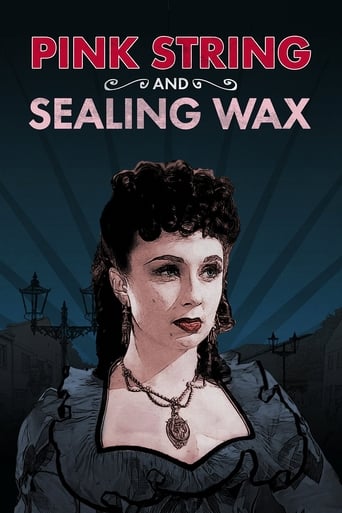kidboots
Robert Hamer was an up and coming Ealing director who had already been paired with Googie Withers in one of the best stories from "Dead of Night", "The Haunted Mirror". Ealing was a studio specializing in programmers during the thirties but after "Dead of Night" started to make a name as a diverse studio with their own particular brand of comedy ("Passport to Pimlico", "The Lavender Hill Mob") and bleak drama ("It Always Rains on Sunday" and later "Mandy") and glorious Googie Withers was occasionally on hand to add her professionalism and terrific acting skills. I agree with the reviewer who said that Withers was not restricted to any genre - she was as good in period costume as she was playing an up to date woman ("The Haunted Mirror" ) or a drab slattern ("It Always Rains on Sunday").Toward the end of the war film makers hit pay dirt with a series of lurid Victorian melodramas, one critic called Gainsborough Gothic - "The Wicked Lady", "Fanny By Gaslight" etc and one of Ealings contributions was the ambiguously named "Pink String and Sealing Wax". The title seemed to come from the unusual way the chemist did up his little parcels but even the symbolic significance escaped me unless it was the neat and tidy way Sutton wanted his life to run. It could have stood on it's own as a lurid murder story (along the lines of "Ivy") and Googie Withers was a long time being introduced as the mercenary Pearl but the subplot involving the harsh family life of the chemist's children didn't take too much away from the more salacious doings down at "The Dolphin".Mervyn Johns, a really unsung actor, plays dour Edward Sutton who runs the chemist shop and when seen walking jauntily along the street, a bystander remarks "Oh, the girl must be going to hang" - Sutton being the foreman of the jury!! He rules his household with a rod of iron - scoffing at his son David's (youthful Gordon Jackson, his "Hudson" days long in the future) efforts at poetry writing, forcing his older daughter, Victoria, into a teaching career when her heart is set on opera and taking younger daughter Peggy's (Sally Ann Howes) pet guinea pigs away to experiment on!! Nice bloke!!!In despair David walks down to "The Dolphin" where he becomes entangled with Pearl, the predatory wife of the local publican. He is soon under Pearl's spell and when he takes her to the chemist's to dress her cut hand she spins him her side of the story about how her brutal husband beats her and leads her a miserable existence, conveniently leaving out her promiscuous and provocative ways. She is keen on low life Dan Powell who says he would be keen on her - if she were a widow but Pearl doesn't need much encouragement and when innocent David, in an effort to engage her in conversation, commences a run down on how various poisons work, Pearl instantly steals some in her handkerchief the minute his back is turned. With the knowledge she has garnered it looks like being the perfect murder until Dan's discarded mistress Louise puts two and two together and goes to the police!!I thought it ended pretty dramatically - I definitely didn't want to see a trial where Googie was given her just deserts, but also the "humanizing" of Edward Sutton when he realises his son could be implicated in the sordid affair was a little too pat - perhaps the scene where his wife stood up to him in his treatment of Victoria helped as well!!Highly Recommended.
Alex da Silva
Pearl (Googie Withers) is unhappily married. She is having an affair with the unscrupulous Dan (John Carol) and befriends David Sutton (Gordon Jackson) who works at his father Edward's (Mervyn Johns) chemist shop. A chemist shop gives you access to poisons........so guess what Pearl has in mind for husband Joe (Garry Marsh)? Can she get away with her plan...? Mervyn Johns, John Carol and Googie Withers put in the best performances. In fact, the whole cast are good, apart from Sally Ann Howes who plays "Peggy" and, despite a couple of funny moments, is as wooden as ever. Even the comedy character of "Miss Porter" played by Catherine Lacey is on the right side of irritating. Unfortunately, the story only develops when Pearl is on screen. There are 2 definite parts to the story and the better episodes take place at the pub. What a shame that large sections of the film are devoted to family life at the Sutton household. We really don't need the storyline concerning the 2 daughters, Victoria (Jean Ireland) and Peggy. Mervyn Johns is a good enough actor to portray tyrannical power without back-up from these women. Victoria wants to pursue a singing career against her father's wishes. After being subjected to her shrill voice on more than one occasion, the audience can only take his side in this matter. There is one very cringeworthy scene where we are subjected to her singing the whole of "There's no place like home" to a professional singer and it's just terrible. She sings on several more occasions in which she just becomes excruciatingly annoying. We even have to home in on her voice during a church scene where the congregation are singing a hymn......Stop it!......She sounds crap! I was slightly let down by the ending to this film - it seemed a cop-out. I wanted to see a trial and maybe a final twist - I think the best option for Pearl would have been to leave town sharpish! Despite the tedious sections of atrocious singing in this film, it is a film that is worth keeping to watch again.
laika-lives
What is it about Brighton? It seems to have become the nexus of corruption, violence and crime in British film, and, with 'Brighton Rock' a year or so later, this film established the city as the home of British Noir.It may be a slice of Victorian Sensation Fiction adapted for the screen, but the plot is pure Film Noir. Googie Withers is the Femme Fatale, luring a disillusioned young man into a plot to kill her husband, but ultimately undone by circumstance. Gordon Jackson is a more virtuous hero than either Fred MacMurray in 'Double Indemnity' or John Garfield in 'The Postman Always Rings Twice', unlike them innocent of his paramour's cold blooded scheming but like them crucially providing the key to Getting Away With It.Quite obviously, this film isn't up to the standard of those two true Noirs, particularly Billy Wilder's classic; there's too many subplots fighting for attention - Jean Ireland's singing ambitions, Sally-Anne Howes' Animal Rights antics, Mervyn Johns' education in sensitivity - and they all ultimately fall by the wayside, payed nothing but lip service in the final scene. Unfortunately, they detract from the main plot enough to weaken it - it doesn't get enough screen time, and the resolution feels just a little too easy.Googie Withers, however, is clearly having great fun as one of the British screen's few true Femme Fatales - her only real rivals are Joan Greenwood in 'Kind Hearts and Coronets' and the scenery chewing Margaret Lockwood in 'The Wicked Lady'. She has a remarkable face - sensual but not conventionally beautiful - and she was never more lovingly shot than she was here by Robert Hamer. She's one of the few British stars who could convincingly play a tough, working class landlady, trading insults and blows with her husband, but with the allure to fascinate both naive youths and seasoned womanisers (Greenwood would have been too refined, Lockwood too obviously a man-eater). She's so good that she unbalances the film - she has so much appeal that her defeat leaves a sour taste in the mouth, and so strong that we can't believe that she'd simply give in as she does. It's a common problem that the wicked women of the forties and fifties - and just as relevantly, of Victorian Melodrama - are so much more vital and entertaining than their patronising male victims or vapid female rivals that the endings seem too moralistic by half. I want them to win. The one flaw in 'Double Indemnity' is Barbara Stanwyck's final, fatal change of heart. Much better for her to have gone out like Jane Greer in 'Out of the Past', a trail of dead men in her wake.Nobody else matches Withers, although Jean Ireland isn't as bland as the role she is playing, and Mervyn Johns is convincingly starchy as the tyrannical patriarch. Gordon Jackson is likable, particularly in his scenes of dissolution, but from whom did he inherit that Scottish accent? Sally-Anne Howes borders on the annoying, but that's the part she's playing. Mary Merrall is dignified as the mother, and good in her quiet confrontations with her husband, but she has little else to do. Catherine Lacey is superlative in the small but significant role of a 'respectable' barfly - she turns out to be more than just comic relief.Hamer's direction is unshowy, but gets the most out of the period sets. If only he could have stripped down the script and adapted the film to respond more to Googie Withers' performance, this could have been a minor classic. As it is, it pales next to Ealing's comedies, but certainly has its moments. There's no other film quite like it.
csrothwec
Excellent acting from the lead players, (especially from Mervyn Johns as the puritanical Victorian pater familias and Googie Withers as the pub landlady and murderess), and a good supporting cast as well mean that this Victorian-era pot boiler set in Brighton could have been something special, given the right direction. Unfortunately, though, it lacks this latter quality and the plot development is disjointed and lacks the necessary twists and thrills to have done the job. What results is a very average, Saturday afternoon matinee thriller, which leaves you thinking of the many ways it could have been improved upon. Perhaps a film studies seminar could use it for this purpose? 6/10.




